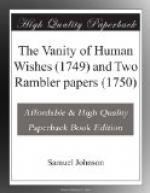eighteenth century and undervalued by the nineteenth.
The first half of the twentieth has shown a marked
impulse to restore them, as a series, to a place of
honor second only to the work of Addison and Steele
in the same form. Raleigh, in 1907, paid discriminating
tribute to their humanity. If read, he observed,
against a knowledge of their author’s life, “the
pages of The Rambler are aglow with the earnestness
of dear-bought conviction, and rich in conclusions
gathered not from books but from life and suffering.”
And later: “We come to closer quarters
with Johnson in the best pages of The Rambler
than in the most brilliant of the conversations recalled
by Boswell. The hero of a hundred fights puts
off his armour, and becomes a wise and tender confessor.”
Latterly, the style of Johnson’s essays has
been subjected to a closer scrutiny than ever before.
What Taine found as inflexible and inert as a pudding-mold
is now seen to be charged with life and movement,
vibrant with light and shadow and color. More
particularly, Wimsatt has shown how intimately connected
is the vocabulary of The Rambler with Johnson’s
reading for the Dictionary, and how, having mastered
the words of the experimental scientists of the previous
century, Johnson proceeded to put them to original
uses, generating with them new stylistic overtones
in contexts now humorously precise, now philosophically
metaphorical, employing them now for purposes of irony
and satire, and again for striking directly home to
the roots of morality and religion. In a playful
mood, he is never more characteristic than when he
is his own mimic, propounding with mock seriousness
some preposterous theory like that of the intellectual
advantages of living in a garret:
I have discovered ... that the tenuity of a defecated air at a proper distance from the surface of the earth accelerates the fancy, and sets at liberty those intellectual powers which were before shackled by too strong attraction, and unable to expand themselves under the pressure of a gross atmosphere. I have found dullness to quicken into sentiment in a thin ether, as water, though not very hot, boils in a receiver partly exhausted; and heads, in appearance empty, have teemed with notions upon rising ground, as the flaccid sides of a football would have swelled out into stiffness and extension.
This is one side of his genius; but another, and profounder, appears in the eloquent simplicity of such a passage as the following, against our fears of lessening ourselves in the eyes of others:
The most useful medicines are often unpleasing to the taste. Those who are oppressed by their own reputation will, perhaps, not be comforted by hearing that their cares are unnecessary. But the truth is that no man is much regarded by the rest of the world. He that considers how little he dwells upon the condition of others, will learn how little the attention of others is attracted




